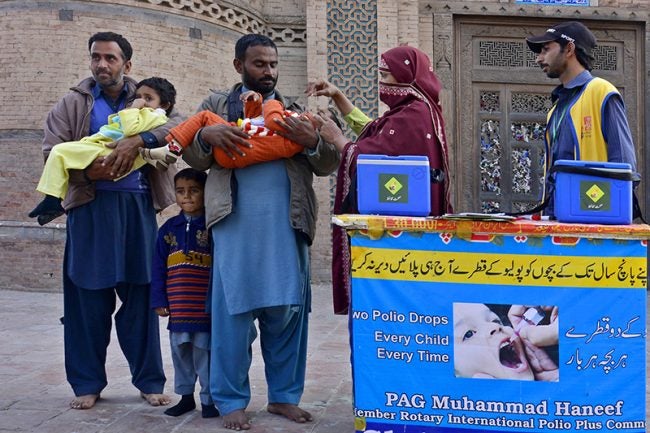The Fight Against Polio in Pakistan: Enduring Challenges and Recent Setbacks
Imran Ahmed
4 January 2022Introduction
The breakdown of a ceasefire agreement between the Pakistani government and Tehreek-e-Taliban Pakistan culminated in attacks on a polio vaccination team in the Tank district of Khyber Pakhtunkhwa killing a policeman and injuring a paramilitary officer. It is striking that institutions and personnel related to public health were the premier targets to mark the renewed beginning of armed conflict between hardline religious militants and the state. However, this is not a new phenomenon. Attacks on polio vaccinators are now commonplace in Pakistan even though new polio cases continue to be reported around the country making the vaccination programme of critical importance. Indeed, 147 cases were reported in 2019 and 84 in 2020. While only one case was reported in 2021, polio transmission remains a major risk facing the Pashto-speaking population, internally displaced persons and core reservoirs in Karachi, Peshawar and Quetta. At present, Pakistan is not only considered endemic with the virus, but the country also poses a high risk of exporting polio.
Polio can be transmitted through the faecal-oral route or through contaminated food and water. Those who are affected are mostly children below the age of five with approximately one in 200 cases resulting in permanent paralysis. What makes polio difficult to contain is that the virus can be widespread in a community before it is detected since infected individuals show only mild symptoms resembling the common cold. The eradication of polio then requires a near 100 per cent vaccination rate amongst children. Up to 10 per cent of those paralysed die when their breathing muscles become immobilised. Those who live on, often face discrimination and stigma because of their disabilities. A global campaign to eradicate polio was established at the Forty-first World Health Assembly in 1988. The event marked the launch of the Global Polio Eradication Initiative. The programme proved to be a success and by 2006, just four countries were considered endemic, namely, India, Pakistan, Afghanistan and Nigeria. In 2014, India was declared free of polio. The same year, however, the World Health Organization (WHO) rendered polio a Public Health Emergency of International Concern.
Challenges and Setbacks
The sheer logistical challenge of administering the polio vaccine across Pakistan presents gargantuan difficulties requiring a vast network of volunteers and healthcare workers. However, nepotism, poor training, job insecurity and dissatisfaction, low salaries and the threat of violence and danger impede the efficient and consistent administering of the vaccine, especially to rural and remote areas. The decentralised nature of the healthcare system in the country following the 18th Amendment of 2010 has also resulted in staff shortages, issues of governance, record keeping, accountability and oversight. This devolution of the healthcare system burdened the provinces with the responsibility to secure vaccines, often resulting in corruption at the local level and the purchase of vaccines which have not passed the WHO’s standards at inflated prices. The uncertainty over the safety and quality of the vaccines further exacerbates vaccine hesitancy in Pakistan where concerns that the polio vaccine violates Islamic law and misinformation is widespread. Social media appears to have worsened the problem and made the struggle against misinformation more difficult.
The politicisation of vaccination programmes in Pakistan has resulted in a discourse that often frames vaccine programmes as an instrument of state or foreign control or surveillance. This has been detrimental in building vaccine confidence and continues to undermine the safety of health workers. The combined effect of these developments has meant that vaccination teams and healthcare infrastructure are frequent targets for religious militants and radical groups who are mistrustful of the state and international healthcare intervention.
Conclusion
The advent of the COVID-19 pandemic has further complicated progress. Its emergence saw an initial suspension of the polio eradication programme and a diversion of healthcare resources towards the fight against the pandemic placing communities at greater risk of polio infection and transmission. As public health scholars warn, “Now, more than ever, it is essential that Pakistan scale up its polio efforts to vaccinate missed children during the disrupted vaccines campaigns. Any gains made by the Pakistan polio program are precarious given the latent potential for polio outbreaks.”
. . . . .
Dr Imran Ahmed is a Visiting Research Fellow at the Institute of South Asian Studies (ISAS), an autonomous research institute at the National University of Singapore (NUS). He can be contacted at iahmed@nus.edu.sg. The author bears full responsibility for the facts cited and opinions expressed in this paper.
-
 More From :
More From :
-
 Tags :
Tags :
-
 Download PDF
Download PDF



